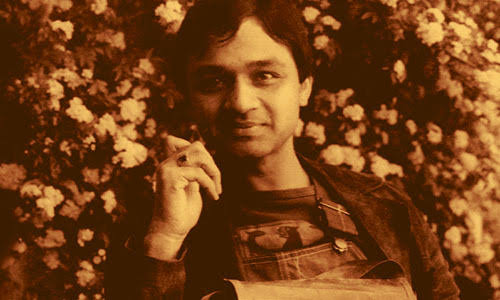Article ::
Shahswat Amit
Caged Heaven
“Nothing better than memories, and there is nothing worse than
them.”
—Anton Chekhov
There is a famous story. Once Mughal Emperor Shah Jahan visited the Shalimar Gardens in Kashmir. Shah Jahan, awestricken by the immeasurable scenic beauty of Kashmir, uttered:
“गर फिरदौस बर रूये ज़मी अस्त
हमी अस्तो हमी अस्तो हमी अस्त”.
This thought of the emperor resonated with Shahid’s own viewing of his beloved, tempting him to translate the Emperor’s words,
“If there is heaven on earth,
It is this, it is this, it is this.”
Though at the same time recognizing this heaven as the one that is unfortunately, but surely “caged”. In 1930, poet Allama Iqbal delivered a presidential address at the annual meeting of the Muslim League. Planting the seeds for the two-nation theory and unknowingly spelling doom for Kashmir, turning it into a geo-political point of contention. A situation still getting worsened by the dilly-dallies of powerplay, puppeteers being the authorities of Indian and Pakistan alike. A deal struck with India (The Instrument of Accession) in moments of paranoia, set Kashmir on a slippery slope. Pushing paradise and its people on a slide of chaos.
“The Paradise on earth turned into a Paradise Lost.’’ (Manan Kapoor, A Map of Longings)
The situation as of now is that the fate of Kashmir and Kashmiris are completely in the merciless hands of hegemony. The hegemonical grips choking the land and its people slightly more tight with each passing day, taking them away from the normalcy of their lives, slowly but surely. This indefinitely absurd and chaotic state of his beloved Kashmir urged an unbearable pain of separation in Shahid. For his homeland, his inheritance. It should also be noted that the question of inheritance becomes very complex in the case of Kashmir because of its spatial position always being in a state of fragility and dismay – a house trafficking in prison cells and refugees, a state of land that even the authorities dare not to speak upon or shine light upon. During his time away from home, Kashmir acquired new meanings as well for Shahid. From being a symbol for home to slowly turning into a metaphor for a lost homeland, a feeling that Shahid tries to encapsulate in his poem “Postcard From Kashmir”. He provides his own perspective as he gazes at the Himalayas that surround Kashmir. Through his works he never dreamt of an utopian Kashmir, aware of his home being a place lost to time, and vowing to “sing of the promising and not the promised end”. While himself reminiscing about his home, he also came to understand the nostalgia her mother felt while describing her home to him, and Shahid realizing what the conflation of history with memory could do. A process that he turned into art, and making this poem of his ornament, his yearning. As he feels his love for his homeland being “overexposed”:
“Kashmir shrinks into my mailbox,
my home a neat four by six inches.
I always loved neatness. Now I hold
the half-inch Himalayas in my hand.
This is home. And this is the closest
I’ll ever be to home. When I return,
the colours won’t be so brilliant,
the Jhelum’s waters so clean,
So ultramarine. My love
so overexposed.
And my memory will be a little
out of focus, in it
a giant negative, black
and white, still undeveloped.”
It is the sign of a great poet to speak for an entire civilization, capturing the dialectics of life in all its totality. Shahid brings a brilliant intertexuality in his works, by conveying his own emotions through the emotions of a civilization. Presenting an inbetweenness (a gap between the ideal and the real) and this gap making him long for his beloved even more. He is aware that the valley has so far been known for little else but its famed beauty, and thus in his works there is a conscious effort to portray Kashmir with a specificity of a local. To speak back to his people even as he writes out to the world. About a homeland severed from the world. As from the poet:
“Normalcy, normalcy,
It sounds obscene when one realizes it is built on seventy-thousand
corpses. The peace of the graveyard, the normalcy death gives way
to.”
—Agha Shahid Ali.
Shahid retains everything through memory, making his remembrance a political act. The world has a bitter-sweet habit of not forgiving easily and mostly keeping the bad parts in their memories of the past. Only of those days on which the sun did not shine! However, Shahid uses his craft and his memory to bring out the good parts of our collective and individual past as well. Making memory crutches of a traumatized consciousness, and thus being able to show the way forward, of moving on. To forgive and co-exist. In the process, never being regressive or submissive towards the pain of separation, and never compromising his craft for polemics. Between love and hatred, he chose love; Between life and death, he chose life; and Between hegemony and marginalization, he chose marginalization.
*
Sufia Nishan
“They ask me to tell them what Shahid means:
Listen, listen:
It means “the beloved” in Persian,
“witness” in Arabic.”
—Agha Shahid Ali
Shahid was born a Shia muslim in a secular household. Something which in itself hinted of an abode placed out of its own time.
He spent his childhood days circled with literary influences from all over the world, as well as influences of the people present in his own life. Shahid’s grandmother, Begum Zaffar Ali, was the first woman matriculate of Kashmir. Reciting verses to her grandson of Kashmiri poets, and in the process inscribing a deep understanding of Urdu and Islamic traditions in Shahid. He was a man and a poet shaped by the value systems which he inherited, though the biggest imprinton his soul was left by his mother, Sufia, who taught him about the one thing lacking most in the world. Empathy.
Sufia belonged to a lineage of sufi saints and mystics, inheriting the sufiana thought of yearning for the loss of the beloved. She hailed from Awadh, having to permanently move to Kashmir after her marriage, and Shahid vividly remembered her mother’s
words being filled with nostalgia. When she told her son about her own childhood in the plains of Uttar Pradesh. Sharing every landscape of her memory, from remembering the showers of monsoon, as well as the bhajans of Krishna that echoed in her ears.
“…..and I, one festival, crowned Krishna by you,
Kashmir
listening to my flute. You never let the gods die.”
Agha Shahid Ali;
Lenox Hill.
Sufia’s childhood in Awadh also made her appreciate the thumri tradition of the region of elegies written on the separation of Radha and Krishna. These folk songs, and the words of his mother gave Shahid the understanding of blending various identities into one. His thoughts creating a space of understanding where dualities weren’t pitted against each other, and are rather viewed as a natural occurrence. Shahid’s recollection of his mother’s nostalgia inspired him to remember his own memories of childhood, in the form of the poem “Season of the Plains”. Reminiscing about his mother who herself is indulged in an act of remembering her childhood. And this style of juxtaposing one memory with another, in a single poem, bringing out the complexities of Shahid’s art.
“In Kashmir, where the year
has four clear seasons, my mother
spoke of her childhood
in the plains of Lucknow, and
of that season in itself,
the monsoon…..”
Sufia tells Shahid about the feelings of yearning that are heightened in the season of monsoon. Telling a curious mind about Krishna’s flute being played alongside Jamuna, when the rain comes. But with joy, rain also brings a burning urge of longing. Something which Sufia felt was present in the soulful notes of Siddheshwari and Rasoolan Bai.
“…….. when Krishna’s
flute is heard on the shores
of the Jamuna. She played old records
of the Banaras thumri-singers,
Siddheshwari and Rasoolan, their
voices longing, when the clouds
gather….”
The voices of these singers yearned for their beloved, their “blue god” whose physical absence increases the pain they feel being apart from him, their separation becoming more and more unbearable with every drop of falling monsoon rain. Longing for a Godot who never arrives.
“…..for that invisible
blue god. Seperation
can’t be borne when the rains
come: this every lyric says. ….”
People of the subcontinent worship the monsoon and they are right to do so, for monsoon fills the ponds, lakes, and rivers of a major part of the South Asian subcontinent, helping life survive in a diverse manner. Shahid, in his recognition of monsoon’s romantic trail over people, also focuses on a subjective detail that the rain’s presence aids i.e. providing lovers with an opportunity to exchange their messages, even fashioning children as their cupids.
“…While Children run out
into the alleys, soaking
their utter summer.
messages pass between lovers
Heer and Ranjha and others
of legends, their love forbidden,
burned incense all night,
waiting for answers…….”
The images of Sufia humming Heer’s lament, and the burning of incense sticks, creates a mystical though soothing fervor. His mother not telling him of her own yearnings in monsoon saddens Shahid, but the “raising soft necks of ash”, “leaning on the humid air” fills the kid with hope. The hope of a beloved to whom the clouds will maybe, just maybe, carry the message of a lover’s yearning. But then again, this entire possibility of messages being carried by clouds, itself turns into an act of yearning. For, “The monsoons never cross/ the mountains into Kashmir”, making the yearning eternal.
Language came naturally to Shahid, whereas his ideas were deeply rooted in the culture of the subcontinent. He put the value of art, and the value of work put behind that art above everything else. Never submitting to the arbitrary notions of ethnicity, sexual orientation, or race behind the creation of a piece of art. He wanted his own work to be recognized for its inherent quality, and not because he was from “a particular background or ethnicity or sexual orientation.”This, he believed, was
“a disservice to poetry.”
***

Shashwat is a student in the Postgraduation Department of Patna University. He can be contacted at shashwatamit10@gmail.com.

